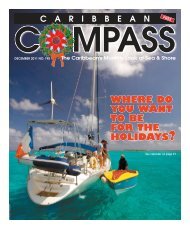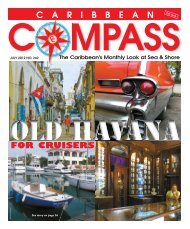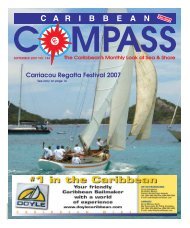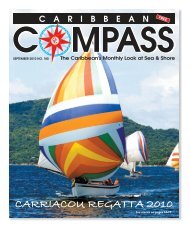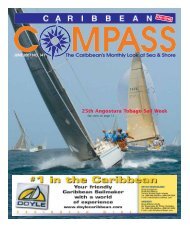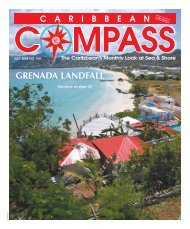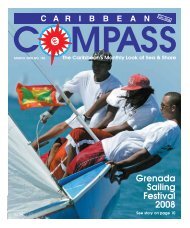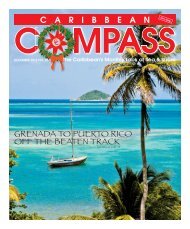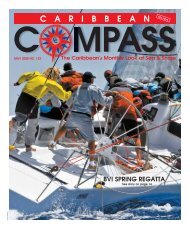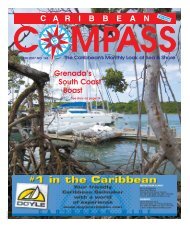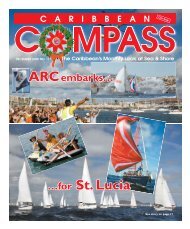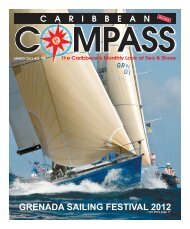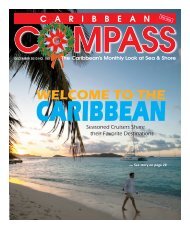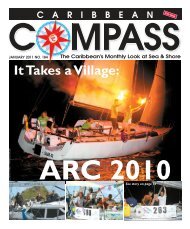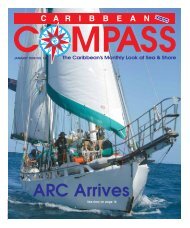You also want an ePaper? Increase the reach of your titles
YUMPU automatically turns print PDFs into web optimized ePapers that Google loves.
— Continued from previous page<br />
On Panda, our Morgan 41 O/I, we use small, but<br />
loud alarms obtained from Radio Shack, that cost<br />
three dollars each. I have an alarm in the binnacle, so<br />
we can hear if the pump is going off underway, and<br />
another in our aft cabin, which alerts us if a leak, such<br />
as an overflowing head, develops at night and brings<br />
water into the bilge.<br />
To properly test an automatic bilge pump system the<br />
bilge needs to be flooded. For years I verified float<br />
switch operation, as our bilge is deep and poorly<br />
accessible, by using a fishing gaff to manually lift the<br />
floats and then listen for the pump to come on. Several<br />
years ago we flooded the bilge while replacing the<br />
packing in the stuffing box and to our disappointment<br />
one of the bilge pumps failed to come on. Later I<br />
checked the switch with the gaff and it did actuate the<br />
pump. The only way to simulate an alarm situation is<br />
to accurately duplicate the real trigger for that alarm.<br />
Finally, all vessels should be equipped with a high<br />
water alarm. Ours is a good quality float switch located<br />
at the top of both of our electric bilge pumps and is<br />
wired into two, 110 decibel alarms. To kill the alarms,<br />
which is necessary if one is to think properly during a<br />
crisis, there is a switch located inside the engine room,<br />
forcing the operator to inspect that area before silence<br />
can be achieved.<br />
Michael Rosner<br />
S/V Panda<br />
Dear <strong>Compass</strong>,<br />
Michelle Fleming is correct in her article in the May<br />
issue of <strong>Compass</strong>: the south coast of Puerto Rico is<br />
good cruising. In fact, rather than the six days she<br />
spent running along this coast, it can easily provide<br />
three weeks or more of puddle jumping.<br />
But making a mistake on entering Puerto Patillas,<br />
especially if coming from the east, can be disastrous.<br />
My guide to Puerto Rico and the Spanish, US and<br />
British Virgin Islands gives more detailed information<br />
on entering Puerto Patillas than does Van Sant’s. (In<br />
comparison to the cost of running a boat and feeding<br />
a crew, the cost of a guide is negligible. Buy every<br />
guide available to an area you plan to cruise or traverse.)<br />
I am interested to note that the entrance is now<br />
buoyed. This information will immediately go into<br />
www.imray.com, where the mariner can find the<br />
updated information for all Imray charts.<br />
Not having my guide on board, Ms. Fleming and her<br />
cruising companion missed what I consider the best<br />
part of cruising the south coast of Puerto Rico, the La<br />
Parguera area (see Street’s Guide pages 30 through 33<br />
and Imray Iolaire chart A11). This area provides a good<br />
half-dozen or more completely sheltered anchorages,<br />
inside off the village or outside behind one of the offshore<br />
reefs. I was told of this area by the late CCA Blue<br />
Water medal winner, Frank Casper of Elsie II, the<br />
world’s most unassuming round-the-world singlehanded<br />
sailor.<br />
The only chart of this area is Imray Iolaire A11. The<br />
La Parguera section of the chart was developed from<br />
an unpublished US Coast and Geodetic (forerunner of<br />
NOAA) survey done in 1933. I discovered this survey<br />
when I was researching chart information in NOAA<br />
head office in DC back in the mid-Eighties.<br />
I also discovered why we had so many surprises<br />
exploring the south coast of Puerto Rico, where I spent<br />
a lot of time on Iolaire’s lower spreaders and got firmly<br />
“parked” between Cayo Real and Vieques (go to www.<br />
street-iolaire.com, click on through to “pilot stories”<br />
and you will find the amusing story). All the charts of<br />
Puerto Rico were done between 1901 and 1911, and<br />
except for major harbors, none of the areas had been<br />
resurveyed nor charts updated!<br />
Don Street<br />
Glandore, Ireland<br />
Dear <strong>Compass</strong>,<br />
There has been a steady stream of piracy articles in<br />
<strong>Compass</strong> in recent years, including, lately, ideas for<br />
resisting them.<br />
Nan Hatch’s April poem, “Pirates”, dreams of giving<br />
pirates what they deserve — hooray! In May’s Forum,<br />
Karl on Cochi proposes some methods — good luck.<br />
About a year ago, I started a fictional tale that<br />
begins with an armed pirate attack in which my hero<br />
resists and, against all odds, wins. He was later asked<br />
by a friend, “And your judgment? Resisting armed<br />
pirates?” “It’s got to be one of the stupidest things I’ve<br />
ever done. Still....”<br />
My hero had used a sailing maneuver to defeat the<br />
pirates, a catastrophic jibe. The trick may or may not<br />
work, but only in a very limited range of circumstances,<br />
and with a boat with certain similarities to my own<br />
little yacht.<br />
When my hero tells his story, his inventor friend,<br />
Gizmo, replies, “Three armed pirates wearing body<br />
armor. You wouldn’t have had a chance if you had<br />
been armed.” Gizmo’s inventor mind then goes for the<br />
essence. “The secret was surprise. And using force<br />
greater than your own.” But both agree that luck<br />
played a major role.<br />
The two then invent some pirate traps, which my<br />
hero characterizes as, “Exciting stuff. Deliberately rigging<br />
a sailboat with lines intended to drag you over-<br />
board. Like playing with loaded guns.” “Difference<br />
being,” Gismo adds, “that flack suits protect against<br />
loaded guns, but not against loops of rope.”<br />
Resisting pirates has risks similar to running from<br />
an anchorage that is on the forecast track of a storm.<br />
Either choice could get you hurt. And some boats and<br />
crews are more competent than others. But there are<br />
far more experts in dealing with storms than dealing<br />
with pirates. And among the non-experts on pirates<br />
will be those who are, nonetheless, convinced of their<br />
untested strategies.<br />
Among my favorites is the flare gun. I once fired a<br />
flare into the sea, and decided that if I’d hit a man with<br />
it, it would have bounced off and made him angry. He<br />
wouldn’t burst into flame as he does in Hollywood or<br />
the rum shop. Pointing a flare gun at a single, lightly<br />
armed thief might work; it is a convincing show — he<br />
wouldn’t know... maybe.<br />
I don’t put any credibility on the idea of outmaneuvering<br />
a powered speedboat with a yacht, other than possibly<br />
ramming them at close quarters... or maybe just<br />
bumping them and making them more angry. Some<br />
yachts may be fast enough to stay ahead in a chase.<br />
It might be useful for bareboat companies to offer<br />
attractive packages to Special Forces units who want<br />
yachting vacations in areas where piracy is rife.<br />
My advice on piracy is the same as my sailing mentor’s<br />
advice on hurricanes. “The best thing is to be<br />
where they ain’t.”<br />
Nan Hatch’s poem wonders if “ego boost” is why<br />
pirates are so abusive to their victims. I think it has<br />
more to do with guilt, which they counter by deciding<br />
that their victims are vile, deserving of the worst.<br />
Here’s another quote from my story: “Good luck.”<br />
Hutch<br />
S/Y Ambia<br />
Dear <strong>Compass</strong>,<br />
In response to Karl on Cochi’s letter in the May issue<br />
on how to deal with pirates between Trinidad and<br />
Grenada, I too have now decided on a number of preplanned<br />
actions that I would deploy if sailing between<br />
these two islands:<br />
• If at all possible I would travel during the day in<br />
any conditions other than 20 knots of wind and eight<br />
foot waves, to lessen the chance of coming across any<br />
yachts carrying out Karl’s procedures on me!<br />
• If I travel at night I would pay close attention to<br />
other craft, paying particular attention to craft that<br />
suddenly turn east if I am in their vicinity. If I find one<br />
maneuvering in such a way, I will immediately go in<br />
completely the opposite direction!<br />
• I would keep my radio tuned to North Coast Radio<br />
to ensure that I know if I am being considered a threat<br />
by other sailing vessels.<br />
• I would avoid going anywhere near the stern of any<br />
other yacht by approximately 200 feet for fear of<br />
entanglement in a line that is being trolled.<br />
• I would at all times be looking out for craft in general<br />
that are in distress due to having lost their outboards,<br />
or are submerged or on fire, or whose crew are<br />
swimming helpless in the water after having had their<br />
boat mysteriously sunk.<br />
If you think that these measures are too much for<br />
most of you please re-read Karl’s letter and truly consider<br />
the merit of his actions, keeping in mind that<br />
boats that have been dealt with using these methods<br />
may well not be pirates. How does Karl know they are?<br />
I am not sure where the real danger lies here: with<br />
us or them!<br />
Scot Hermiston and family<br />
Sea Warrior<br />
Dear <strong>Compass</strong>,<br />
Just a short note in answer to the letter from Yousaf<br />
Butt of S/V Bibi Gul (May issue of the <strong>Compass</strong>) regarding<br />
the security situation in Portsmouth, Dominica,<br />
having improved from what it was five years ago.<br />
Last year my husband and I were beaten up and<br />
robbed of everything in Portsmouth by three men, armed<br />
with machetes and a gun, who swam out to our boat at<br />
night while we were anchored off the Customs dock.<br />
I have been told by a number of people in Dominica<br />
that this was entirely our own fault, as we were not<br />
anchored in the patrolled area. The music was too<br />
loud for our liking outside Big Papa’s restaurant and<br />
we had no idea at the time how very dangerous Prince<br />
Rupert Bay is.<br />
The other couple who were also boarded, robbed and<br />
beaten up by the same men just seven weeks later were<br />
also at fault, having anchored outside the patrolled<br />
area, not as far away as us, though — they were near<br />
the Indian River when they were violently attacked.<br />
I imagine that Yousaf Butt may not have been told<br />
about these attacks that took place so recently, or<br />
perhaps he has heard a different version of events.<br />
My point is, however noisy and crowded the patrolled<br />
area is, do not take chances in anchoring anywhere<br />
else in the bay — it is not safe.<br />
I am informed by the Dominican Police that one of<br />
the three attackers from last year remains free on<br />
bail. Also there have been other boardings and particularly<br />
violent attacks on yachts in Prince Rupert<br />
Bay in the past.<br />
—Continued on next page<br />
FOR SALE<br />
96’ UTILITY TUG<br />
with luxurious interior<br />
Current flagship fl agship of ofsalvage salvage company. company<br />
Twin screw working vessel,<br />
12v71 Detroits 4.5:1 reductions,<br />
fully fendered, 3 generators, full electronics.<br />
Incredible interior, cork fl oors,<br />
granite countertops, all stainless<br />
appliances, whirlpool tub, hot tub.<br />
Priced to sell $475,000 • Located BVI<br />
becky@huskysalvage.com<br />
���������������������������������������<br />
����������������������<br />
����������������������<br />
����������������������������������<br />
���������������������<br />
����������������������������������������������<br />
����������������������������������<br />
���������������������������@���������<br />
�����������������������������<br />
�������������<br />
���������������<br />
��������������������������<br />
��������������<br />
����������������<br />
JULY 2010 CARIBBEAN COMPASS PAGE 37



